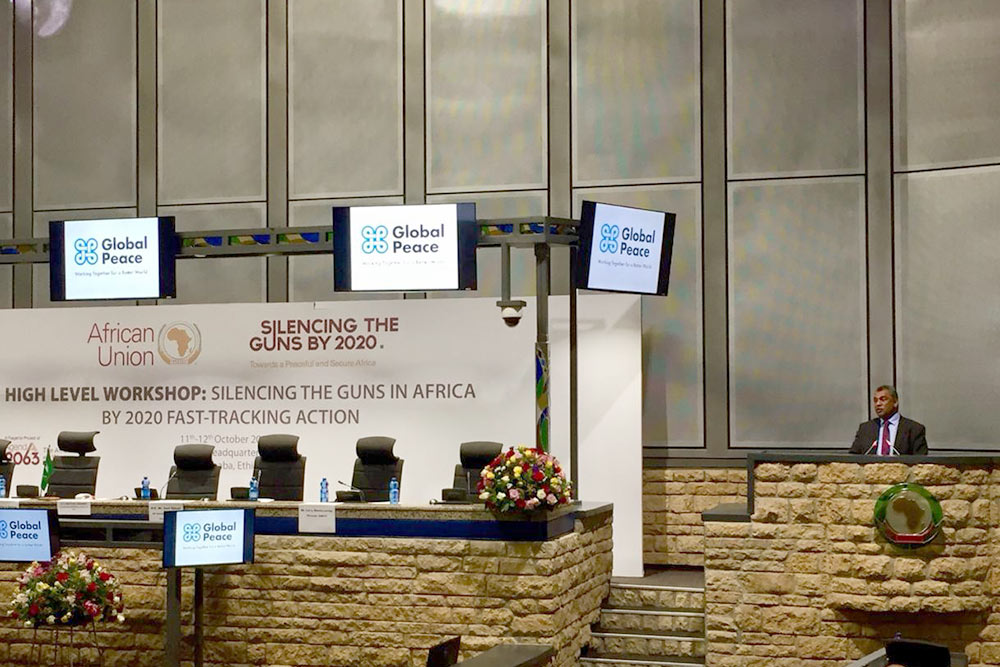Subscripe to be the first to know about our updates!

Silencing the Guns by 2020
Tom Collins
Africa’s dream of a conflict-free continent is formally expressed within the African Union’s roadmap to ‘Silence the Guns’ by 2020. As the deadline draws near Smail Chergui, African Union Commissioner for Peace and Security, takes stock of recent developments along with the challenges remaining on the sidelines of the 32nd African Union summit in Addis Ababa, Ethiopia
While insecurity threatens Africa’s development and diplomatic advancement in many regions across the continent including the Sahel, Central Africa and the Horn – the African Union’s Commissioner for Peace and Security, Smail Chergui, believes there are still reasons to be cheerful.
The Central African Republic (CAR) and South Sudan are good examples with both countries signing new peace agreements. Certainly the agreements are shaky with a shared history of broken accords, but conciliatory dialogue between warring parties in both countries suggests ground is being made.
The CAR signed its agreement early this month after two weeks of negotiations in the Sudanese capital of Khartoum.
“We applauded the CAR government and the armed movements for the agreement which we have just achieved,” says Chergui. “It’s really unprecedented compared to the former agreement. For the first time the government met face to face with 14 armed groups and I hope this will really promote dialogue, reconciliation and justice.”
CAR has been at civil war since 2014 with an estimated quarter of the 4.5m population displaced.
In South Sudan, Chergui claims that “almost all arms are quiet in the country” after a revitalisation of a cease fire agreement singed in September.
South Sudan’s President Salva Kiir recently welcomed back former combatants into the ruling party after ruptures within were responsible for the start of the civil war in 2013.
His main rival Riek Machar returned last October to the capital Juba, more than two years after he fled the country in the wake of broken deal.
The Commissioner equally applauded the results from Africa’s most recent elections in Madagascar and the Democratic Republic of Congo (DRC).
The African Union had welcomed both newly-appointed presidents at the opening ceremony in Addis Ababa the day before.
Despite great initial concern both elections were conducted in relative peace and calm, he remarks.
Unrest had gripped the Indian Ocean island of Madagascar as the outgoing president initially refused to yield to opposition demands that he resign before December elections.
After the election was over, Andry Rajoelina, incoming President of Madagascar, was seen with all former heads of state in what was largely considered as a rare moment of reconciliation
When asked about the irregularities in the DRC election, which is widely held to have been illegally-won by President-elect Félix Tshisekedi through a back-door deal with outgoing Joseph Kabila, Chergui responded: “I met yesterday with the president and he is open for dialogue and reconciliation for an inconclusive government.
“We knew this election would not be easy in a country which has so many challenges. The day after the election we saw many people celebrating and we have not seen violence by armed groups.”
Peace it would seem trumps respect for democratic processes at this point.
Continuing threats
Yet the Commissioner was unequivocal in his acknowledgement of the enormous challenges Africa continues to face in terms of peace and security.
“As human beings we cannot accept such levels of violence,” he states.
In Somalia and beyond, the regional terror group Al-Shabaab continues to wreak havoc – recently attacking an office compound in Nairobi, Kenya and killing 21 people.
The commissioner explained that the African Union Mission in Somalia (AMISOM) was never intended as a permanent feature, but leaving anytime soon could undermine their achievement of securing around 80% of the country.
Another issue is the AU’s ongoing struggle to establish legitimacy in the region, leading AMISOM troops to engage in humanitarian activities in order to win the “hearts and minds” of the local populace.
Elsewhere the AU is working with the UN to secure elections in Libya, which has buckled under the weight of a civil war since strongman Muammar Gaddafi was toppled in 2011 and a power vacuum emerged.
While the AU is “joining hands” with the UN to implement a roadmap to elections, including a reconciliation conference, Chergui admits insecurity continues to reign.
Towards Libya’s southern border, the Sahel region continues to present huge security challenges for its governments and the surrounding region.
Chergui comments how terrorist groups associated with ISIS and al-Qaeda have spilled out from traditional hotbeds such as Mali into neighbouring countries like Burkina Faso, which had previously managed to avoid much of the instability.
“The whole of West Africa is on alert,” he concedes.
The African Union, along with the UN and France, is supporting the G5 Sahel peacekeeping force which is made up of troops from Burkina Faso, Mali, Mauritania, Niger and Chad.
The group, however, is beset by issues of funding and coordination.
While around $420m was pledged to support the force in February – from donors including Saudi Arabia and France – Chergui reveals how thus far only $17m has arrived.
Source; New African Magazine